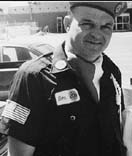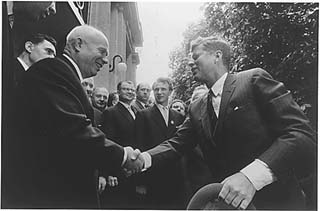Home → Corporations, Elections & Commissions → Elections & Voting → Voter Information → Vote in Honor of a Veteran → Table of Contents → Cuban Missile Crisis
Cuban Missile Crisis (1962) |
|
In 1962 there were growing concerns that the Soviet Union was preparing to secretly supply missiles to Cuba, missiles that could deliver nuclear warheads. This posed a particular risk to the U.S. with Cuba only 90 miles south of Florida. "On October 14, 1962, U.S. spy planes flying over Cuba spotted the first ballistic missile. On October 16 U.S. intelligence officials presented Kennedy with photographs showing nuclear missile bases under construction in Cuba. The photos suggested preparations for two types of missiles: medium-range ballistic missiles able to travel about 1100 nautical miles and intermediate-range ballistic missiles able to reach targets at a distance of about 2200 nautical miles. These missiles placed most major U.S. cities – including Los Angeles, Chicago, and New York City – within range of nuclear attack. Kennedy also saw evidence of nuclear-capable bombers." –from http://encarta.msn.com The Kennedy administration faced a situation with potentially grave consequences. An attack on Cuba could trigger a global war, but ignoring the threat of this missile build-up could also risk war. Kennedy and his advisors agreed that a surprise air attack against Cuba was the only reasonable response. However, some recommended a blockade as a possible prelude to negotiations. Kennedy went ahead with the blockade; at the same time, the U.S. military began moving soldiers and equipment into position. In a worldwide radio and television address, Kennedy warned Khrushchev that if missiles were fired from Cuba, the response would be a "full retaliatory response upon the Soviet Union." After a series of private negotiations and diplomatic maneuvers, on October 28, 1962, Khrushchev announced their decision to withdraw the missiles from Cuba in return for a "noninvasion pledge" from the United States. A nuclear confrontation had been successfully avoided. The Cold War began to thaw as both super powers realized how close to the brink of nuclear war they had come.
|
|
Veterans who served in the military during the Cuban Missile Crisis were part of this dramatic chapter in world history:
|
|
Wives wrote proudly about their husbands' service during the Cuban Missile Crisis: |
|
|
|
|
|
|
|
Additional Tributes Submitted OnlineTribute to my Husband, RMSN Charles W. Weaver, III: Tribute to my Father, John J. Arsenault, Jr.: |
|
Previous Section | Table of Contents | Next Section


